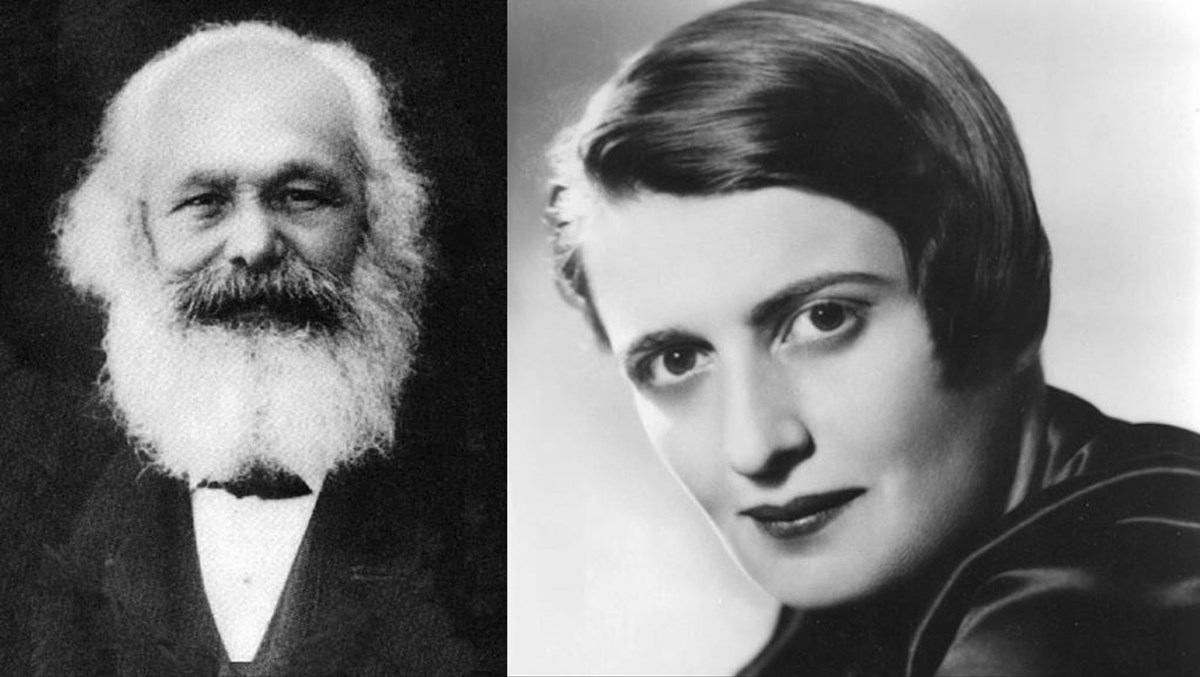The way we think determines the way we live. This is a fact of life. Though some may argue the contrary (the way we live determines the way we think), it will always be made clear that no idea is epiphenomenal.
Karl Marx believed the opposite of this. He argued that history has a certain material pattern, and ideas naturally come from that pattern; that the way we live determines the way we think. To quote the Communist Manifesto, “The history of all hitherto existing society is the history of class struggle.” Marx believed that man’s ideas come from his environment: or more specifically, his “class.”
A man writing in favor of the materialistic non-autonomy of ideas is a man who, as described by Ayn Rand, “seeks to reverse the law of cause and effect.” It is a performative self-contradiction. In the communist manifesto, Marx explains, “In a bourgeois society, the past dominates the present; in a communist society, the present dominates the past.”
The Bolshevik Revolution in Russia was a result of Marx’s writings in Germany, the killing fields in Cambodia were a result of philosophical discussions in Paris, and people who walk the road to serfdom are eventually victims of omnipotent government.
Marx denies that ideas themselves have an independent influence on society and can absolutely develop on their own. While our environment does have at least some effect on us, ideas themselves are paramount, and the external world is simply responsible for spreading those ideas. The Bolshevik Revolution in Russia was a result of Marx’s writings in Germany, the killing fields in Cambodia were a result of philosophical discussions in Paris, and people who walk the road to serfdom are eventually victims of omnipotent government. Life itself is objective, but the way we interact with it is subjective. The way man functions in the world is a result of his fundamental convictions. Form follows function. The physical is a result of the metaphysical—not the other way around.
The Pen of Thomas Paine
These ideas gave people something concrete to fight for, helped them gain foreign assistance, and eventually resulted in independence from Britain.
The American Revolution was a bloody war. For many, the conflict had no apparent moral grounds until 1776, when Thomas Paine released his magnum opus, Common Sense, a pamphlet advocating independence from Great Britain. It was written on the moral grounds of taxation without representation, the immorality of a tyrannical monarchy, and the inevitability of British oppression. These simple ideas completely changed the ideology of the war. They gave people something concrete to fight for, helped them gain foreign assistance, and eventually resulted in independence from Britain. Paine (and Locke) universalized the American Revolution (and later the French Revolution), making it a crusade for humanity. His writing dignified what was otherwise easily interpreted as a nasty civil war of conflicting self-interests.
Albert Einstein and Relativism
In 1905, German-born theoretical physicist Albert Einstein released his “theory of relativity” to the world for the first time. His theory essentially states that all motion must be defined based on one’s frame of reference and that space and time are relative, not absolute concepts. At the time it seemed like just another scientific theory; however, its unforeseen implications on relativism and the modern world would be astronomical.
Einstein’s theory of relativity paved the way for a broader ideology of moral and philosophical relativism, which contributed an even broader movement of modernism.
For almost all of history, space and time were seen as basic objective and absolute principles; however, Einstein’s theory seemed to crush the traditional inherit value system humans had held for so long. Einstein’s theory of relativity paved the way for a broader ideology of moral and philosophical relativism, which contributed an even broader movement of modernism. Since space and time are relative, art, beauty, virtue, happiness, and even truth started to be viewed subjectively, as well.
Ideas Make us Rich
In his Magnum Opus, An Inquiry into the Nature and Causes of the Wealth of Nations, moral philosopher and economist Adam Smith asked the question: How did we (the West) get to where we are now? He correctly answered that the wealth of nations is a result of peace, easy taxes, and a tolerable administration of justice. In her book, Bourgeois Dignity, economic historian Dr. Deirdre N. McCloskey states that “Our riches did not come from piling brick on brick, or bachelors degree on bachelors degree, or bank balance on bank balance, but from piling idea on idea.” The classical understanding that we are all created equal and unique in the image of God has greatly contributed to the rise of property rights and rule of law in the West and has made us the richest society in history.
Ideas that entered the stream of thought centuries ago have continued to inform our cognition and unfold the directions implicit in them.
“Ideas have consequences,” said Richard M. Weaver in his 1948 philosophical masterpiece. And for better or for worse, each of these ideas has had clear consequences. They demonstrate that ideas that entered the stream of thought centuries ago have continued to inform our cognition and unfold the directions implicit in them. Regardless of their possible danger, man’s ability to freely share and debate these big ideas is what has made the West great.
Philosopher Ayn Rand eloquently stated that “The present state of the world is not the proof of philosophy’s impotence, but the proof of philosophy’s power. It is philosophy that has brought men to this state—it is only philosophy that can lead them out.” In this statement, Rand truly captures the momentous concept that ideas have very real and possibly unanticipated implications on society. A misunderstanding of this integral fact of life can and will lead man down deadly and unforeseen ideological paths, while understanding that the way we think determines the way we live will result in the creation not only of wealth but of beauty.
This article was updated to correct an erroneous claim regarding casualties in the American Revolution.

